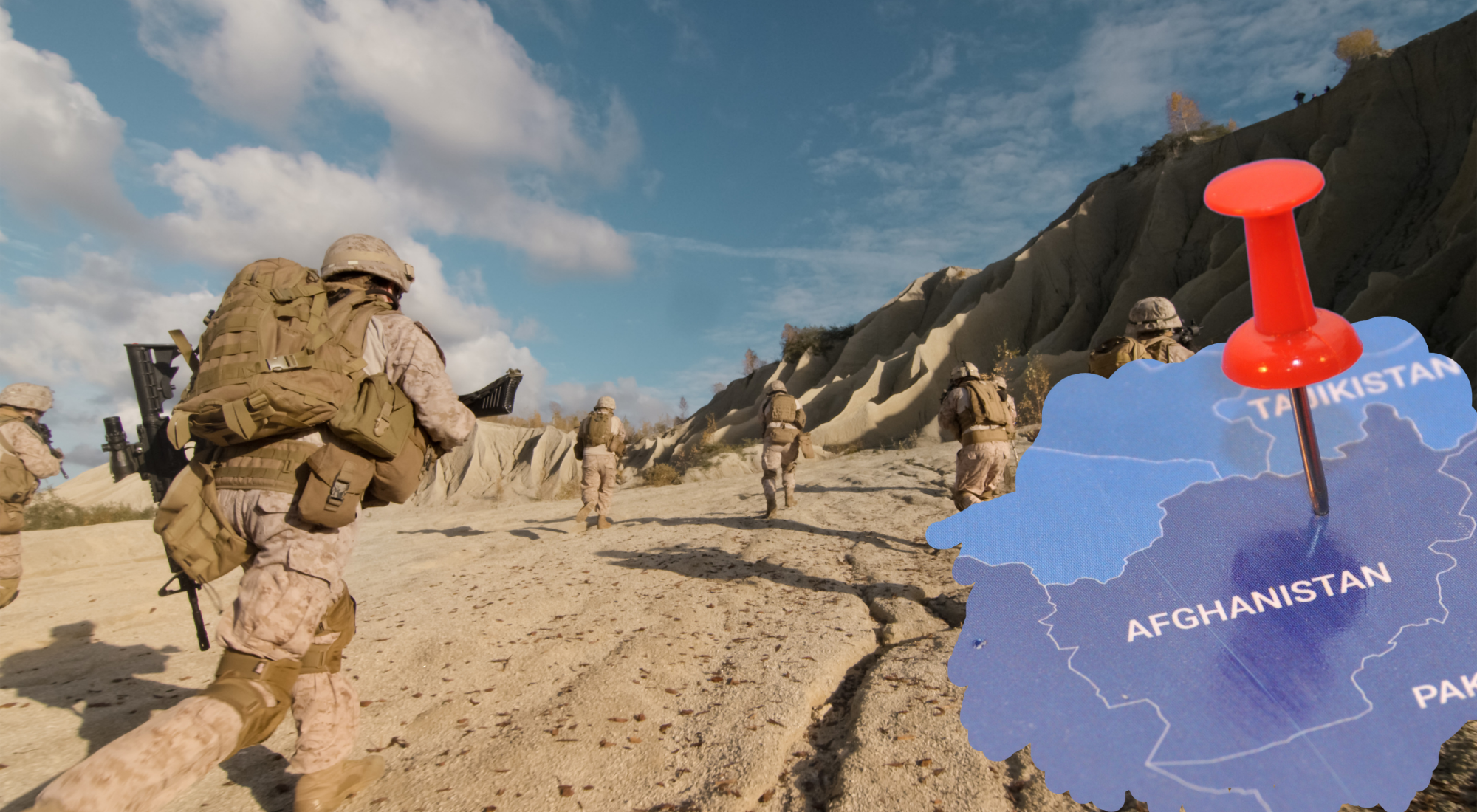“It is past time to end the forever wars, which have cost the United States untold blood and treasure.
As I have long argued, we should bring the vast majority of our troops home from the wars in Afghanistan and the Middle East and narrowly define our mission as defeating al Qaeda and the Islamic State (or ISIS). [1]
Disengagement from the war on terror in Afghanistan and throughout the Muslim world has been a central tenet of realist thought for decades. Realist critics of American foreign policy have historically embraced a doctrine of strategic restraint. Often frustrated by their lack of influence, some of their ideas have now become part of established wisdom reflected in an emerging bi-partisan foreign policy consensus that the war on terror must end.
The need to finish forever wars is emphasized by Trumpian conservatives and progressive Democrats. This should not be surprising. The concept of endless war is inimical to the American tradition that sees military outcomes in binary “win” or “lose” terms.[2]
The roots of current Afghanistan withdrawal disaster, which has led to the deaths of thirteen American servicemen and over 170 Afghans in an Islamic State-Khorasan (IS-K) branch directed terrorist attack, were sown by the Trump Administration flawed February 2020 peace accord with the Taliban.[3] Under the provisions of the agreement, the U.S. pledged to withdraw its forces from Afghanistan by May 1, 2021 in return for a Taliban promise to stop targeting American troops, cut ties with Al Qaeda, and negotiate a comprehensive peace accord with the American supported Afghan government.
Though they refrained from attacking foreign forces, the Taliban violated most of the accord’s provisions. Their insurgency against the Afghan government grew dramatically with the drawdown of American and NATO forces, and Taliban retained strong connections to Al Qaeda’s Central Asian jihadist movement. Promising to extract the U.S. from a forever war, the Biden administration foolishly embraced Trump’s Afghan military disengagement and Afghan peace plan.[4]
Withdrawing from Afghanistan was one of the few points of convergence across the partisan divide. The view that we needed to finish the war on terror has been circulating for years as fatigue of fighting Al Qaeda and the Islamic State across the world and the Middle East’s vexing problems have exhausted America’s patience. Previously, a revisionist current in foreign policy realism is now part of mainstream thought.
This reset of U.S. foreign policy is often justified by the strategic imperative of pivoting toward Asia to meet the Chinese threat. The Obama and Trump Administration sought to divert attention away from a troublesome Middle East and reorient foreign policy toward countering China and Russia. Trump’s 2017 strategic planning document downgrades the war on terror in favor of the game of major power competition where Asia is the epicenter of future geo-military conflict.[5] Though neither administration succeeded in this quest, their overall strategic ambition to do so has remained intact.
American war exhaustion with intractable conflicts across the Middle East and Central Asia has indelibly shaped the Biden foreign policy agenda. President Biden has placed emphasis on American leadership of the international liberal global community and has prioritized domestic concerns, combating climate change, and fighting the Covid-19 pandemic.[6] By ending the forever war in Afghanistan (seen as a drain on precious blood and treasure) and strengthening traditional alliances in Europe and Asia, the U.S., Biden argued, could more effectively check China’s ambition to become a global hegemon.
The Biden Administration justifies leaving Afghanistan by asserting that Al Qaeda no longer has a sanctuary or significant presence in the country. By fortifying alliances and mitigating the damage Trump has done to the global international order the Administration hopes to enter a new ‘Post-ost 9-11” world. [7] Such a strategy has been advocated by international relations realists for decades and it would be helpful to review some of the central premises of the revisionist critique of U.S. grand strategy in the Post- Cold War era.
The realists critique America’s efforts to establish a liberal international hegemony after the Cold War’s end.[8] They argue that Republican and Democratic Administration’s dangerously overextended American military engagement across the world in pursuit of humanitarian purposes and democracy promotion inimical to America’s core interests. Whether in was Somalia or Bosnia or Kosovo these interventions typically squandered American blood and treasure eroding its international legitimacy. The North Atlantic Treaty Organization’s (NATO) eastward progression following the Soviet Union’s collapse furthermore led to the rise of a revisionist Russia intent upon regaining its strategic sphere of influence in Eastern Europe.
America’s enlarged military presence in the Arabian Gulf and the Middle East, realists argue, engendered anti-American sentiment and fueled the development of a global jihadist movement hostile to Western interests.[9] The 9-11 attacks accordingly represented Al Qaeda anger at the U.S. military presence in Saudi Arabia. These critics argue American military interventions in Afghanistan and Iraq have weakened U.S. geo-military standing in the world, emboldened Russia and China, and crippled U.S. economic vitality and global legitimacy.[10]
Only by ending U.S. involvement in the Afghan and Iraqi conflicts and militarily disengaging from the Middle East can America preserve its strategic capacity to counter emerging global hegemons. Though advocates of strategic restraint differ on the scale of the U.S. retrenchment needed across the globe, the core parameters of this revisionist grand strategy are easily discernable. All agree that U.S. troops should be removed from the Muslim world’s combat zones, concur that the American military position in Europe needs to be drastically reduced or eliminated, assert American military budgets must be slashed, and emphasize that diplomacy needs to be strengthened to counter emerging threats. If used at all, military force is seen as a last resort, where all other measures have failed.
Blessed with oceanic separation from Europe and Asia, realists advocate offshore balancing, where America preserves its dominance in the Western Hemisphere and prevents the rise of hegemonic powers in Asia, the Arabian Gulf and Europe by forging regional partnerships.[11] Should American alliances fail to stem a rising hegemonic power, American military intervention might be necessary. Advocates of offshore balancing point to the first Gulf War as an archetypal example of how offshore U.S. military forces should be used to preserve core interests.
Had America simply withdrew its combat troops from the Arabian Gulf after Saddam Hussein’s defeat in Kuwait, and returned to a defensive posture, realists speculate that the entire war on terror might have been avoided.[12] The theoretical foundation of the realist international relations paradigm, however, has sparse empirical support save the 1914-1918 and 1939-1941 periods where the US was forced to intervene in two calamitous world wars that left hundreds of million’s dead.
These are highly problematic examples. Though the realist camp embraced of the Cold War struggle against the U.S.S.R., the period is seen by them as a historic anomaly necessitating a departure from America historic realist grand strategy, whose core interests are dominating the Western Hemisphere, preserving global commerce and preventing the emergence of dominant hegemons in Asia, the Arabian Gulf and Europe.[13]
This prioritization reflects a partition of the world between core and peripheral interests. The latter includes much of Africa, the Middle East and Central Asia. Above all this camp operates under the assumption America has the capacity to balance competing forces in core regions of the world to prevent the emergence of a peer competitor, a claim that lacks empirical validation.
Considered the doyens of modern realism, John Mearsheimer and Stephen Walt are joined by others who posit similar views but offer peculiar slants. Barry Posen, for example, argues America’s desperately needs a grand strategy of restraint that checks Chinese power in an unaggressive manner.[14] In his book, Fareed Zakaria prioritizes America’s role in balancing coalitions and using diplomacy to preserve core U.S. interests with America acting as a democratic beacon of hope for the world.[15] Former Obama Administration advisor Ben Rhodes argues that American disengagement from the war on terror needs to be replaced by an agenda that prioritizes combating climate change, promoting global health and reinforcing democratic ideas across the world.[16] Rhodes, like most realists, sees China as America’s only peer competitor and a dangerous autocratic threat to U.S. primacy.
Despite their differences, these analysts relentlessly criticize the fight against global jihadism and the application of US military power to advance of democratic or humanitarian purposes. All have for years advocated withdrawal from Afghanistan, which they see as endless drain of U.S. resources in a peripheral nation that matters little on the world stage. According to these revisionist critics, America’s military engagement throughout the war on terror has become an incubator of terrorism whose only real antidote is U.S. military disengagement from Middle East and Central Asia.
Though the rise of the Islamic State of Iraq and al-Sham (ISIS) after the departure of U.S. forces in Iraq in 2011 might give these realists pause to reflect upon the wisdom of Middle East disengagement, they remain undaunted in their commitment to ending the war on terror. Reacting to recent events, realists will spin the Afghan withdraw disaster as a longer- term strategic victory to be vindicated by future events, though the future benefits of America’s calamitous Afghan retreat remain impossible to forecast at present.
Proponents of strategic restraint offered the example of U.S. military’s 1973-74 disengagement in Southeast Asia that in their view advanced American strategic interests in Asia.[17] This contention is contradicted by China’s increasing domination in Asia which realists currently assert is America’s main strategic challenge.
Drafted before the Afghan debacle, Foreign Affairs’ recently released twentieth year anniversary review of 9-11 contains mainly a critique of the insupportable costs of forever wars and the urgent imperative for a new American grand strategy.[18] Even such successes as killing Osama bin Laden and weakening Al Qaeda, where a U.S. military presence in Afghanistan was vital, is described as winning ugly .[19] Some of the edition’s authors argue that the war on terror has led to many ills from an immense bureaucratic security state to the rise of American right-wing homegrown extremism.[20]
The moral, military and economic perils of fighting global jihadism have according to realists led to unprecedented failure and provide a new opportunity to reset US foreign policy to make it manageable. This contention is repeated over, and over again. So much so that the proposition has gained increasing prominence. Some in this camp see diplomatic and economic engagement with a victorious Taliban as critical and that the new regime in Afghanistan has every incentive to avoid allowing for a regeneration of Al Qaeda and foreign terrorist groups.[21]
Others see the Afghan debacle as an opportunity to reflect and retreat from the world stage to let American democracy be an example to the world.[22] These views are as delusional as is their belief that Afghanistan disengagement would not hurt the U.S. strategic position vis-à-vis China, Russia and Iran and that the Taliban have learned invaluable lessons from the disastrous alliance with Al Qaeda. The latter assertion is a grotesque fiction, as the strategic partnership between Al Qaeda, the Haqqani Network and the Taliban is melded by forty years of personal, economic and ideological connections impervious to external engagement.[23]
The Taliban’s pledge to prevent a future terror safe- haven obscure the group’s decades long relationship with Al Qaeda. The presence of Al Qaeda foreign fighters in Afghanistan and the Taliban forces protection of the group is meticulously documented in the Long War Journal (LWJ) analysis.[24] When the President declares that Al Qaeda has no presence in Afghanistan, he is either delusional or lying.
Al Qaeda’s current emir, Ayman al-Zawahiri, has sworn loyalty to the past three Taliban leaders. The terror group’s historic relationship with the Haqqani network and the position of the network’s leader Sirajjudin Haqqani as Taliban’s junior leader is evidence that Zawahiri’s ambition to reestablish Afghanistan as a future terror safe-haven remain viable. [25] Though America may want to end the war on terror, the jihadists remain eager to attack Western interests at home and abroad.
Beyond a revived terrorist threat, the Afghan disengagement undermines America’s capacity to meet the strategic challenges of Russian, Chinese, Iranian and North Korean efforts to upend the U.S. dominated international order.[26] The Taliban’s military advance was accompanied by thousands of foreign fighters who streamed into Afghanistan augmenting the ranks of terrorist groups including IS-K, Al Qaeda and Pakistani, Chinese and Uzbek jihadi networks.[27] It is a dangerous presentment of what is likely to emerge under Taliban rule.
The view that ending the war on terror will assist the U.S. in countering the rise of China and Russia ignores the interconnections between great power competition and the ongoing war on terror[28] Russian, Iranian and Chinese involvement in the Middle East and support for the Taliban demonstrate that America’s adversaries see the Biden Administration’s Afghan disengagement as a major victory in their desire to induce American global retrenchment. The Afghan pullout is tantamount to a surrender that simultaneously undermines the war on terror and damages America’s strategic position across the world. Russia, China and Iran are set to gain from the U.S. pullout as each seeks to court good relations with the Taliban. The Chinese eye Afghanistan’s immense mineral wealth and as part of their strategic Road and Belt Initiative.[29]
The Russians and Chinese have greatly expanded their military and economic influence across the Middle East, eroding America’s overall regional position.[30] The rapid expansion of these powers in the region may be comforting to realist analysts who see the area as a quagmire. Many pundits erroneously predicted Russian and Iranian-Hezbollah military intervention would fail in Syria.[31] The Russo-Iranian-Hezbollah alliance’s brutal strengthening of the Assad regime has proven these sophisticated experts wrong. The West continues to live with the immense refugee crisis created by the Syrian civil war, which has been an incubator of jihadi terrorism that has killed hundreds of Europeans.
Jihadists, Iran, China and Russia will likely gain from the Afghan pullout and the precipitous collapse of U.S. credibility. The consequences are also calamitous for the U.S.-European alliance that was to be rejuvenated by the Biden Administration. Stabilizing Afghanistan was, after all, a NATO project. The abrupt, unthinking and unilateral character of the disengagement has hurt the Atlantic alliance. European allies are now questioning U.S. leadership and its general capacity to protect the world’s democracies. [32]
Biden’s rejection of European pleas to extend the mission beyond 31 August 2021 no doubt will sow further divisions. NATO has little operational capacity to stay in Afghanistan once the American force leaves. Hundreds of thousands of American Afghan allies are likely to be stranded and fall victim to Taliban predation. From a realist perspective these Afghans are as inconsequential as the hundreds of thousands of South Vietnamese and millions of Cambodians murdered by victorious communist regimes after the 1974 U.S. departure from Southeast Asia.
The irony of America’s disastrous withdraw is that the recent costs of U.S. military engagement in Afghanistan were manageable. [33] American military presence in the country was vital for intelligence collection and forward base operations. After years of costly nation building and expensive counter insurgency, the U.S. had “right-sized” the war on terror by focusing more on using small special forces operations, local allies and air power to contain the Taliban advance and prevent Al Qaeda’s rejuvenation. This is the same formula that ultimately forced the 2018-2019 collapse of ISIS Iraqi-Syrian caliphate.
The 2011 Abbottabad operation that led to Osama bin Laden’s killing would likely not have been successful had not Afghanistan not been available for U.S. Special forces. The country was vital in directing drone attacks against Al Qaeda Central in the AF-Pak region. Legions of AQ dead commanders and the terror network’s anguished discourse over the crippling effect of America’s drone war testify to this.[34] Though critics may decry this as “winning ugly”, it is better than defeat.
A small residual American land force, foreign contractor support for the Afghan Airforce, and U.S. airpower were the backbone of Afghan security resistance to the Taliban. Once the American military withdrawal was complete, the Taliban advanced rapidly as the Afghan security forces crumbled. Ending forever wars has therefore become convenient political mantra used by the right and left to reset American priorities to disastrous effect.
The cost of the South Korean, Japan and European US troop deployments is considerably more than that expended in Afghanistan, and American military presence in these areas have endured for over sixty years. Apologists will no doubt argue that whether or not we can rely on the Taliban and regional powers to contain the jihadist threat that emanates from Afghanistan, we can counter any emerging threat from a distance.
Offshore balancing is yet another realist trope whose failure is seen in the inability to stem the rapidity of the Taliban advance once American forces left. Failures in counterterrorism from afar were seen before 9-11 where the U.S. failed to stem the rise of a Al Qaeda terror sanctuary. With the U.S. withdraw from Afghanistan, the country has lost an invaluable intelligence network and informants.
The Central Intelligence Agency (CIA) is scrambling to rebuild its human intelligence system in the devastated country and the limits of electronic intelligence gathering are widely recognized in the intelligence community.[35] Finding a suitable regional alternative to Afghanistan is a nonstarter. Pakistan, whose support for the Taliban proved invaluable, is increasingly prone to a visceral anti-Americanism prevents any constructive use of that country. Russian pressure to prevent U.S. basing in neighboring central Asian republics means America will be forced into a posture of over the horizon drone strikes.
America’s military assets in the Arabian Gulf are too remote for real time effective action. The U.S. disengagement from Afghanistan has foreseeable consequences. Three of the deadliest consequences are already visible. First, the revival of jihadist movements throughout Central Asia and Al Qaeda Central’s expansion are likely to have destabilizing consequences in neighboring former Soviet republics. AQIM, Hamas, Al Shabab and Al Qaeda’s African affiliate have hailed the Taliban victory as an augury of things to come.[36] Afghanistan ruled by the Taliban is likely to encourage the Tehrik -i-Taliban (TTP) insurgency in Pakistan as well as to provide succor to extremist groups in Uzbekistan and Tajikistan.
Second, the expansion of Russian, Iranian, and Chinese influence seen across the world is likely to be emboldened by the erosion of U.S. credibility caused by the Taliban’s military victory. Russia and China cannot be counted upon to restrain the Taliban as they favorably look upon the revival of Al Qaeda Central as means to damage American interests. Since 2001, Iran has provided a limited sanctuary to key Al Qaeda leaders.[37] Russian aid to the Taliban and Chinese future involvement in mineral extraction will be an invaluable source of financial support for the Taliban.
Third, NATO is weakened, and its reputation is tatters. This is likely to sow further discord within the alliance. The Afghan refugee crisis shows little sign of abating and is likely to expand after the US withdrawal. America and European allies are poised to turn away hundreds of thousands of Afghan allies as they attempt to leave their country.
The Biden Administration’s commitment to end U.S. military involvement and the Taliban’s subsequent military victory comes upon the advent of the 20th anniversary of the 9-11 attacks. It is difficult to imagine what President Biden will say on the tragic anniversary of Al Qaeda’s Holy Tuesday planes operation. America may be back on the world stage, but it is neither feared, nor loved, nor wanted.
References
[1]Joseph Biden, Why America Must Lead Again: Rescuing U.S. Foreign Policy After Trump” Foreign Affairs (March/April 2020) https://www.foreignaffairs.com/articles/united-states/2020-01-23/why-america-must-lead-again p.72
[2] Russell Weigley, The American Way of War: A History of United States Military Strategy and Policy (New York: Macmillan Publishing Company, 1973)
[3]Kore Schake, “The Roads not taken in Afghanistan: Despite Biden’s Claims Catastrophe was not Inevitable” August 25, 2021 Foreign Affairs https://www.foreignaffairs.com/articles/afghanistan/2021-08-25/roads-not-taken-afghanistan
[4] Joseph Biden, Ibid
[5] “National Security Strategy of the United States December 2017” Office of the Presidency https://trumpwhitehouse.archives.gov/wp-content/uploads/2017/12/NSS-Final-12-18-2017-0905.pdf
[6] Biden, ibid
[7] Ben Rhodes, “The Democratic Renewal: What it will take to Fix U.S. Foreign Policy” Foreign Affairs (September/October 2021) https://www.foreignaffairs.com/articles/united-states/2020-08-11/democratic-renewal
[8] Stephen Walt “The End of Hubris and the Age of American Restraint” Foreign Affairs (May/June 2019) https://www.foreignaffairs.com/articles/2019-04-16/end-hubris; John Mearsheimer and Stephen Walt, The Case for Offshore Balancing: A Superior U.S. Grand Strategy” Foreign Affairs (July/August 2016) https://www.belfercenter.org/publication/case-offshore-balancing-superior-us-grand-strategy
[9] Stephen Walt, “Taming American Power” Foreign Affairs (September/October 2005) https://www.foreignaffairs.com/articles/united-states/2005-09-01/taming-american-power
[10] Ben Rhodes, “Then Versus US: How America Lets its Enemies Hijack its Foreign Policy” Foreign Affairs (September/October 2021) https://www.foreignaffairs.com/articles/united-states/2021-08-24/foreign-policy-them-and-us
[11] John Mearsheimer and Stephen Walt, ibid
[12] Ibid.
[13] Stephen Walt, “The End of Hubris”, ibid
[14] Barry Posen, “Pullback: The Case for a Less Activist Foreign Policy” Foreign Affairs (March/April 2018) https://www.foreignaffairs.com/articles/united-states/2013-01-01/pull-back
[15] Fareed Zacharia, The Post-American World (New York: W.W. Norton, 2008)
[16] Ben Rhodes, “Us Versus Them”, ibid
[17] Mark Atwood Lawrence, “The Real Saigon Analogy: Vietnam was not the End of U.S. Credibility and Neither is Afghanistan” Foreign Affairs August 27, 2021 https://www.foreignaffairs.com/articles/afghanistan/2021-08-27/real-saigon-analogy
[18] Foreign Affairs Magazine (August/September 2021) https://www.foreignaffairs.com/issue-packages/2021-08-24/who-won-war-terror
[19] Elliot Ackerman, “Winning Ugly: What the War on Terror Has Cost America” Foreign Affairs (September/October 2021) https://www.foreignaffairs.com/articles/middle-east/2021-08-24/winning-ugly
[20] Thomas Hegghammer, “Resistance is Futile: The War on Terror Supercharged State Power” Foreign Affairs (September/October 2021) https://www.foreignaffairs.com/articles/middle-east/2021-08-24/resistance-futile .’ Cynthia Miller-Idriss, “The War on Terror Supercharged the Far Right” Foreign Affairs (September/October 2021) https://www.foreignaffairs.com/articles/united-states/2021-08-24/war-on-terror-911-jan6
[21] Vanda Felab Brown, “Why the Taliban Won: And What can Washington do about it?” Foreign Affairs August 17, 2021 https://www.foreignaffairs.com/articles/united-states/2021-08-17/why-taliban-won
[22] Andrew Bracevitch, “The Misuse of American Power: The U.S. Made a Terrible Mess in Afghanistan” Boston Globe August 16, 2021 https://www.bostonglobe.com/2021/08/16/opinion/through-its-misuse-military-power-united-states-has-made-terrible-mess-afghanistan/
[23] Thomas Joscelyn, “No, Mr. President, Al Qaeda is Not Gone from Afghanistan: The Taliban have Freed Many al Qaeda fighters. And then there is the Haqqani network” Foundation for the Defense of Democracies August20, 2021 https://www.fdd.org/analysis/2021/08/20/no-mr-president-al-qaeda-not-gone-from-afghanistan/
[24] Ibid.
[25] Ibid
[26] Bradly Bowman, “Afghan War Critics Blame Biden for the Current Chaos: They Need to look in the Mirror” Foundation for the Defense of Democracies August 28, 2021 https://www.fdd.org/analysis/2021/08/25/afghanistan-war-critics-need-to-look-in-the-mirror/
[27] Colin Clarke, “What the Terrorism Landscape Looks Like After the Taliban Victory? Foreign Policy Research Institute of Philadelphia Augst20, 2021 https://www.fpri.org/article/2021/08/what-will-the-terrorism-landscape-look-like-in-a-taliban-led-afghanistan/
[28] Michael Eisenstradt, ”Beyond Forever Wars and Great Power Competition: Rethinking the U.S. Military Role in the Middle East” Washington Institute for Near East Policy June 1, 2021 https://www.washingtoninstitute.org/policy-analysis/beyond-forever-wars-and-great-power-competition-rethinking-us-military-role-middle
[29] Alexander Cooley, A Post American Central Asia: How the Region is Adapting to the U.S. Defeat” Foreign Affairs August 23, 2021 https://www.foreignaffairs.com/articles/afghanistan/2021-08-23/post-american-central-asia
[30] Anna Borshchevskaya, “How Russia Stands to Gain from Biden’s Afghan Disaster” Washington Institute for Near East Policy August 18, 2021 https://www.washingtoninstitute.org/policy-analysis/how-russia-stands-gain-thanks-bidens-afghanistan-disaster; Michael Doran and Peter Right, “China’s Emerging Middle Eastern Kingdom: China’s Drive for Supremacy in the Middle East is now underway—-and it won’t end there.” Tablet Magazine August 2, 2020 https://www.tabletmag.com/sections/israel-middle-east/articles/china-middle-eastern-kingdom
[31] Michael Kofman, “The Russian Quagmire in Syria and Other Washington Fairytales” The Wilson Center February 16m 2018 https://www.wilsoncenter.org/article/the-russia-quagmire-syria-and-other-washington-fairy-tales
[32] Bradly Bowman, ibid.
[33] Hal Brands and Michael O’Hanlon, “America Failed its Way to Counterterrorism Success: How a Flawed War on Terror Yielded the Right Approach” Foreign Affairs August 12, 2021 https://www.foreignaffairs.com/articles/2021-08-12/america-failed-its-way-counterterrorism-success
[34] Daniel Byman, “The Good Enough Doctrine: Learning to Live with Terrorism” Foreign Affairs (September/ October 2021) https://www.foreignaffairs.com/articles/middle-east/2021-08-24/good-enough-doctrine
[35] Mark Mazzetti, Julian Barnes and Adam Goldman, “Amid Afghan Chaos, a CIA Mission that will Persist for Years” New York Times August 27, 2021 https://www.nytimes.com/2021/08/27/us/politics/cia-afghanistan.html
[36] Aaron Zelin, The Return of the Islamic Emirate: The Jihadist State of Play” Washington Institute for Near East Policy August 18, 2021 https://www.washingtoninstitute.org/policy-analysis/return-islamic-emirate-afghanistan-jihadist-state-play
[37] Thomas Joscelyn, “Al Qaeda’s Deputy Emir Killed in Iran” Foundation for the Defense of Democracies November 15, 2020 https://www.longwarjournal.org/archives/2020/11/analysis-al-qaedas-deputy-emir-killed-in-iran.php








